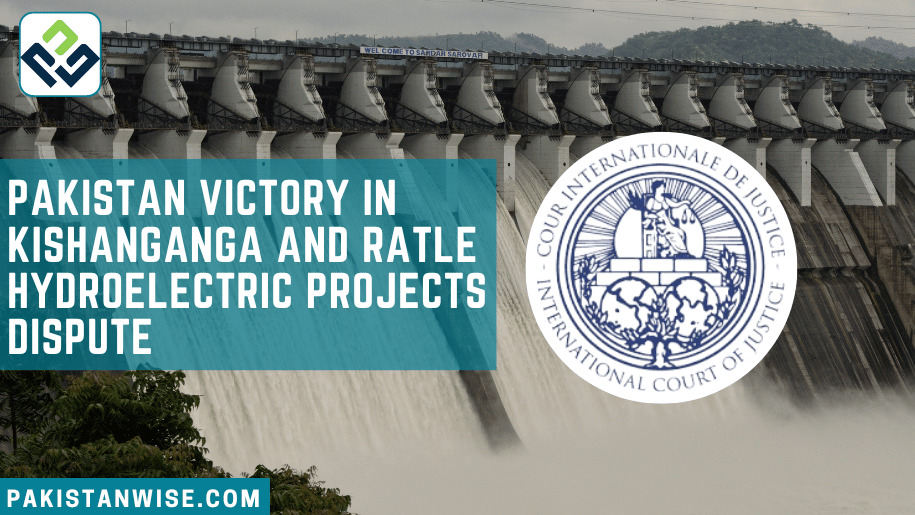In a significant development, the Permanent Court of Arbitration (PCA) in The Hague has ruled in favor of Pakistan, asserting its right to hear the case regarding the Kishanganga and Ratle hydroelectric projects. This decision marks a major win for Pakistan in the long-standing disagreement with India over the construction of these projects, which revolve around concerns about the Indus Waters pact and the sharing of water resources between the two countries.
At the heart of the dispute lies Pakistan’s apprehension regarding India’s plans to establish hydroelectric projects on rivers passing through the region. Pakistan argues that these initiatives violate the Indus Waters pact, an agreement that outlines the principles for water allocation between the two nations.
Pakistan initially expressed its concerns about the Kishanganga project in 2006, followed by similar apprehensions raised about the Ratle project in 2012. Despite multiple rounds of talks aimed at resolving the issue, India consistently refused to address Pakistan’s worries, prompting Pakistan to file a case with the PCA in 2016.
The World Bank, acting as the mediator for the treaty, halted the dispute resolution processes and urged both countries to reach a mutual consensus on the appropriate forum for resolving the matter. Unfortunately, Pakistan and India failed to reach an agreement, leading the PCA to step in and declare its jurisdiction over the case. It is important to note that the PCA’s decision is final and binding, leaving no room for further alteration.
The PCA’s role in this case is to interpret and apply the Indus Waters Treaty, specifically examining the provisions pertaining to hydroelectric projects and how past decisions made under the treaty impact the current legal framework. This ruling is expected to shed light on the appropriate interpretation and utilization of the treaty, providing clarity on the rights and obligations of both Pakistan and India.
The Indus Waters Treaty, signed in 1960, has been a crucial instrument for maintaining water cooperation between the two nations for over six decades. Under this agreement, the Indus River and its tributaries are allocated between the two countries, with Pakistan primarily benefitting from the Western Rivers (Indus, Jhelum, and Chenab) and India receiving the Eastern Rivers (Ravi, Beas, and Sutlej) for utilization.
However, disputes and contentions have emerged periodically, particularly regarding the construction of hydroelectric projects by India. Pakistan argues that these projects can potentially hinder the flow of water into its territory, adversely affecting its agricultural and irrigation systems. These concerns are rooted in the perception that the hydroelectric projects allow India to exert control over the river flow, thereby compromising Pakistan’s water resources.
The Kishanganga and Ratle projects, specifically, have been the subject of intense debate. The Kishanganga project, located in the Indian-administered region of Jammu and Kashmir, involves the diversion of water from the Kishanganga River to generate electricity through a run-of-the-river scheme. Pakistan argues that this diversion violates the treaty’s provisions regarding water usage and poses a threat to its own power generation capacity.
Similarly, the Ratle project, also situated in Jammu and Kashmir, aims to construct a 850-megawatt run-of-the-river hydroelectric power plant on the Chenab River. Pakistan maintains that this project contravenes the treaty and has expressed concerns about its potential impact on the river’s water flow.
The PCA’s ruling serves as a crucial step towards resolving this protracted dispute. By asserting its jurisdiction, the court has opened the door for a comprehensive examination of the treaty’s provisions and their application to the Kishanganga and Ratle projects. This decision holds significant implications for the future of water cooperation between Pakistan and India and reinforces the importance of adhering to the agreed-upon frameworks for resolving disputes.
Moving forward, it is imperative for both countries to respect and abide by the PCA’s decision. This ruling not only upholds the principles of international law but also contributes to maintaining peace and stability in the region. It offers an opportunity for constructive dialogue and negotiation, enabling the two nations to find a mutually beneficial solution that addresses their water needs while respecting the rights and interests of each party.
In conclusion, the PCA’s decision to hear the case regarding the Kishanganga and Ratle hydroelectric projects is a significant victory for Pakistan. It provides an avenue for resolving the long-standing disagreement between Pakistan and India and offers an opportunity to interpret and apply the Indus Waters Treaty accurately. By adhering to the principles of international law and engaging in constructive dialogue, both countries can work towards a sustainable solution that ensures the equitable sharing of water resources and promotes regional cooperation.

